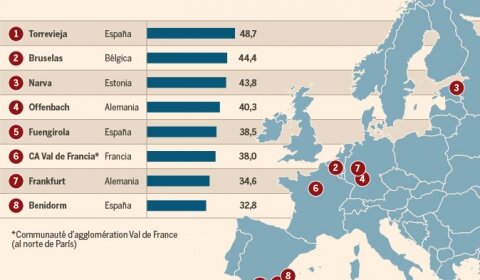
The British are a simple nation. Well, in terms of breakfast habits anyway. We’re generally happy with a cup of tea or coffee, and it usually doesn’t matter in what shape or form that first morning drink arrives.
In Spain, it’s a much more complicated matter, however. Have you ever seen a group of Spaniards ordering their coffee in a bar? One wants it served in a glass, another in a cup, one wants sugar and the other saccharin. Then there’s the one that wants only a little coffee, while another prefers room-temperature milk. No two orders are ever the same!
Breakfast is an important meal of the day. It usually consists of some form of coffee, but across the country different regions have their different habits. Read on to find out the typical breakfast traditions in each area and in Spain, and whether you follow the habits of your fellow residents.
- 80% of Spaniards say that they eat breakfast every day. This is a high percentage considering the fact that we probably all know someone that doesn’t eat it. According to the survey, probably due to the economic crisis, 90% of people have their breakfast at home during the week, and even more do so at the weekend.
- Lack of time is not the main excuse for not eating breakfast, curiously enough. It is the second though. The majority (42%) don’t have breakfast because when they wake up they aren’t hungry. A further 25% apparently wake up well after breakfast time has finished, which is another reason for missing it.
- Spaniards may say that they have breakfast at home, but in general they only dedicate 5 or 10 minutes to this important meal of the day, which is barely sufficient enough to prepare a feast fit for a king, or even eat it in a relaxed manner. In Cataluña, people are not in so much of a rush and spend 10 – 20 minutes enjoying this meal, while in Murcia and Aragón this meal is much more accelerated and finished within just 5 minutes.
- According to the survey, 43% of those asked said that they have breakfast between 7 and 8.30am. At the weekend, this changes to any time between 8.30 and 10am.
- And if you didn’t already know it, Spain is a coffee-drinking nation, with 70% of people drinking it with their first meal of the day. Milk is the second most popular breakfast drink, but with only half the number of coffee fans consuming it first thing. Regions where drinking coffee early in the morning is an absolute must include Andalucía, the Balearic Islands, Cataluña, Valencia, Madrid, Murcia, Extremadura, the Basque Country, Asturias and Cantabria.
- While there are 1,001 ways of preparing coffee in Spain, the most popular by far is the ‘café con leche’, which is what 75% of those surveyed drink in the morning. Most will also add sugar or sweetener (80%), ignoring advice given out by the coffee experts to take it black and without sugar.
- Spain is known for being a nation of coffee lovers, but 52% of those asked said that they only drink one cup of the black stuff a day – at breakfast. What about the sacred coffee taken mid-morning? Well, apparently only 36% of us would rather drink coffee at this time of day over downing one before leaving the house for work.
- Sweet or savoury? That is a question that can divide families at breakfast-time. Well, the former is triumphant, but only just with 55% of the votes. However, 60% of young people aged between 18 and 29 prefer something sweet in the morning to go with their coffee, and men tend to prefer the sweeter option too (57%). This is more common in the regions of Aragón and Castilla y León too.
- Mind you, there are regions where nearly everyone can’t start their day without three main ingredients: bread, tomato and oil. A ‘media tostada’ is the predominant breakfast order for those living in Andalucía and Cataluña, with many opting for a topping of delicious, salty ‘jamón serrano’ on top.
Source: www.20minutos.es
Categories:









